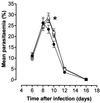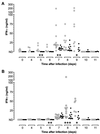Complement contributes to protective immunity against reinfection by Plasmodium chabaudi chabaudi parasites
- PMID: 11349051
- PMCID: PMC98407
- DOI: 10.1128/IAI.69.6.3853-3859.2001
Complement contributes to protective immunity against reinfection by Plasmodium chabaudi chabaudi parasites
Abstract
We have studied the impact of deficiency of the complement system on the progression and control of the erythrocyte stages of the malarial parasite Plasmodium chabaudi chabaudi. C1q-deficient mice and factor B- and C2-deficient mice, deficient in the classical complement pathway and in both the alternative and classical complement activation pathways, respectively, exhibited only a slight delay in the resolution of the acute phase of parasitemia. Complement-deficient mice showed a transiently elevated level of gamma interferon (IFN-gamma) in the plasma at the time of the acute parasitemia compared with that of wild-type mice. Although there was a trend for increased precursor frequencies in CD4(+) T cells from C1q-deficient mice producing IFN-gamma in response to malarial antigens in vitro, intracellular cytokine staining of spleen cells ex vivo showed no difference in the numbers of IFN-gamma(+) splenic CD4(+) and CD8(+) cells. In contrast, C1q-deficient animals were significantly more susceptible to a second challenge with the same parasite. C1q-deficient animals showed a reduced level of anti-malarial immunoglobulin G2a (IgG2a) antibody 100 days after primary infection. However, following a significantly higher parasitemia, C1q-deficient mice had increased levels of IgM and IgG2a anti-malarial antibodies. In summary, this study indicates that while complement plays only a minor role in the control of the acute phase of parasitemia of a primary infection, it does contribute to parasite control in reinfection.
Figures




Similar articles
-
Plasmodium chabaudi chabaudi: differential susceptibility of gene-targeted mice deficient in IL-10 to an erythrocytic-stage infection.Exp Parasitol. 1996 Nov;84(2):253-63. doi: 10.1006/expr.1996.0111. Exp Parasitol. 1996. PMID: 8932775
-
IFN-γ-induced priming maintains long-term strain-transcending immunity against blood-stage Plasmodium chabaudi malaria.J Immunol. 2013 Nov 15;191(10):5160-9. doi: 10.4049/jimmunol.1300462. Epub 2013 Oct 16. J Immunol. 2013. PMID: 24133169
-
Parasite-specific IgM plays a significant role in the protective immune response to asexual erythrocytic stage Plasmodium chabaudi AS infection.Parasite Immunol. 2005 May;27(5):171-80. doi: 10.1111/j.1365-3024.2005.00760.x. Parasite Immunol. 2005. PMID: 15987340
-
The response of CD4+ T cells to Plasmodium chabaudi chabaudi.Immunol Rev. 1989 Dec;112:71-94. doi: 10.1111/j.1600-065x.1989.tb00553.x. Immunol Rev. 1989. PMID: 2575075 Review.
-
A dual role for B cells in Plasmodium chabaudi chabaudi (AS) infection?Res Immunol. 1994 Jul-Aug;145(6):412-9. doi: 10.1016/s0923-2494(94)80170-3. Res Immunol. 1994. PMID: 7899705 Review.
Cited by
-
The Use of Filter-Purified Merozoites to Assess Anti-Merozoite Immunity.EBioMedicine. 2016 Dec;14:11-12. doi: 10.1016/j.ebiom.2016.11.023. Epub 2016 Nov 19. EBioMedicine. 2016. PMID: 27913154 Free PMC article. No abstract available.
-
Complement and Antibody-mediated Enhancement of Red Blood Cell Invasion and Growth of Malaria Parasites.EBioMedicine. 2016 Jul;9:207-216. doi: 10.1016/j.ebiom.2016.05.015. Epub 2016 May 14. EBioMedicine. 2016. PMID: 27333049 Free PMC article.
-
Identification of phosphorylated proteins in erythrocytes infected by the human malaria parasite Plasmodium falciparum.Malar J. 2009 May 18;8:105. doi: 10.1186/1475-2875-8-105. Malar J. 2009. PMID: 19450262 Free PMC article.
-
Fc-receptors and immunity to malaria: from models to vaccines.Parasite Immunol. 2009 Sep;31(9):529-38. doi: 10.1111/j.1365-3024.2009.01101.x. Parasite Immunol. 2009. PMID: 19691552 Free PMC article. Review.
-
Requirement for complement in antibody responses is not explained by the classic pathway activator IgM.Proc Natl Acad Sci U S A. 2011 Oct 25;108(43):E934-42. doi: 10.1073/pnas.1109831108. Epub 2011 Oct 10. Proc Natl Acad Sci U S A. 2011. PMID: 21987785 Free PMC article.
References
-
- Bellamy R, Ruwende C, McAdam K P, Thursz M, Sumiya M, Summerfield J, Gilbert S C, Corrah T, Kwiatkowski D, Whittle H C, Hill A V. Mannose binding protein deficiency is not associated with malaria, hepatitis B carriage nor tuberculosis in Africans. Q J Med. 1998;91:13–18. - PubMed
-
- Botto M, Dell'Agnola C, Bygrave A E, Thompson E M, Cook H T, Petry F, Loos M, Pandolfi P P, Walport M J. Homozygous C1q deficiency causes glomerulonephritis associated with multiple apoptotic bodies. Nat Genet. 1998;19:56–59. - PubMed
-
- Carroll M C. The role of complement in B cell activation and tolerance. Adv Immunol. 2000;74:61–88. - PubMed
Publication types
MeSH terms
Substances
LinkOut - more resources
Full Text Sources
Medical
Research Materials
Miscellaneous

